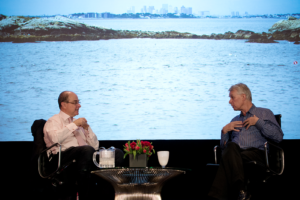by Angela Herring
For every one of the 7 billion people on Earth, up to 10 times that many bacteria have taken up residence in and on them. “We provide a nice home for them,” said Nobel Laureate Sir Richard Roberts, who was recently appointed Distinguished University Professor in Northeastern University’s College of Science.
However, Roberts said many people are unaware of this important ecosystem. “Most people think of bacteria as rather nasty objects you want to stay away from. People are busy washing their hands all the time and putting hand sanitizers on. But this is all very bad,” Roberts said. “Bacteria are our friends.” He added, “If you remove all the bacteria crawling around your skin … you wouldn’t survive very long at all.”
On Monday afternoon, Roberts delivered his lecture titled “Why I love bacteria,” describing not only why bacteria are important to sustain human life but also how they are so aesthetically pleasant. The several hundred trillion microscopic individuals helping to keep each of us alive and healthy, Roberts said, only scratches the surface of the extreme biodiversity encapsulated in the planet’s entire bacterial population. In fact, he noted that if you added up all the planet’s bacteria, the total would significantly outweigh the organisms we can actually see.
“Bacteria are very beautiful, but you don’t see them unless you have a microscope,” said Roberts, who received the Nobel Prize in physiology or medicine for his discovery of split genes in 1993. “That may be why we’ve become wary of them,” he said.
The event not only welcomed Roberts to Northeastern but also celebrate Northeastern’s partnership with the Ocean Genome Legacy, a publicly accessible biorepository of some of the ocean’s strangest and most rare species.
Roberts’ lecture took the audience—including those at the standing-room only Curry Student Center and others watching online—on a journey of beautiful bacteria from the depths of Earth’s oceans to the planet Mars. He introduced us to spiral shaped bacteria that move through the water like dancers and to aquaspirillum, which invented its own internal microscope billions of years before humans were even around.

President Aoun and Chairman of Ocean Genome Legacy (OGL) Sir Richard Roberts talk about Roberts’ talk titled, “Why I Love Bacteria.”
He pointed out several bacterial species that are commonly associated with disease—rickettsia causes typhus, treponema denticola causes periodontal disease, and helicobater pylori causes ulcers and some cancers, though it also seems to prevent asthma.
What’s more, the world’s oceans represent as much of a treasure trove of undiscovered microbial species as the human body, housing as much bacterial biomass as 50 million blue whales.
In both cases, Roberts said, the key to learning from them is to decode their complex DNA sequences. “As we get better and better at being able to read DNA and knowing what the potential for any given organism is, so it will be easier for us to make a very good prediction about how an organism will behave on the basis of its DNA sequence,” he explained.
In part to support that effort, Roberts is the chairman of the board of Ocean Genome Legacy, also known as the OGL. Founded in 2001 by Dr. Donald Comb, the nonprofit environmental research organization and DNA bank was established to capture valuable DNA samples from bacteria and other organisms around the globe as insurance against extinction—and to serve as an important tool for research and historical record.
“There are so many species disappearing from our oceans at the most incredible rate,” Roberts said. “We probably can’t save the species per se, but if we have samples of the DNA, which we can then sequence at some point, we do at least know what the genes were, what these organisms were capable of.”
Last year, the Ocean Genome Legacy found a new home at Northeastern’s Marine Science Center. President Joseph E. Aoun, who led a Q-and-A session following Roberts’ lecture, hailed the partnership.
“We’re very happy to have you here,” Aoun said. “Let’s work together to reach the goals you have outlined.” He also introduced a new video unveiled to the audience that highlights this partnership and the unprecedented wealth of knowledge the OGL provides Northeastern research faculty and students, and researchers around the world.
Since his days at Coldspring Harbor Laboratory working with DNA-co-discoverer James Watson, Roberts has opted for a less-mainstream approach to research. He helped establish New England Biolabs, the company founded by Comb that launched the OGL, to provide a profitable service to scientists in an effort to fund his own and his colleagues’ research.
“What you’re doing is living a very different model,” Aoun said. Indeed the partnership between the two organizations is itself an extension of that unique model.
Originally published in news@Northeastern on March 25, 2014.
